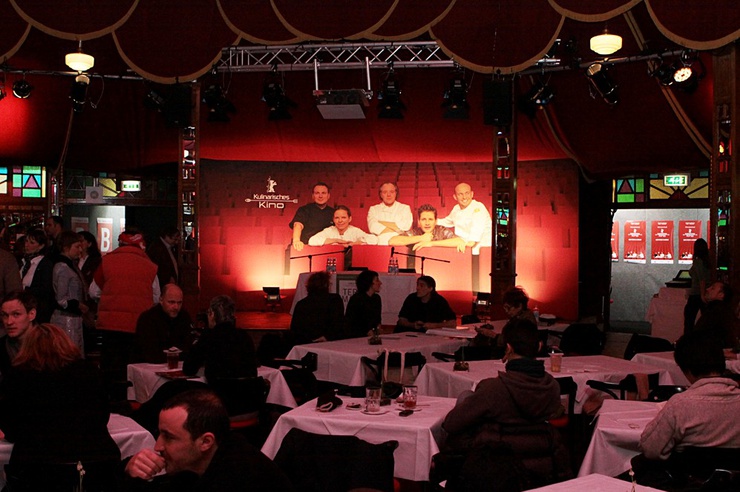
'Give food a chance': culinary cinema in Berlin
Published on
Translation by:
Annie RutherfordAt the 61st Berlin international film festival, the 'culinary cinema' series of events drew attention to the 'relationship between film, culture, cuisine and the environment' for the fifth time.
Together with menus from top chefs in the Gropius Mirror restaurant, a mixture of films about nutrition and the environment reinforce the belief of festival director Dieter Kosslick: 'Food brings people together and connects them to their surroundings'
Renowned top cheps watched films from the main programme in their aprons and used themes from the films as inspiration for their menus. Red miso soup, lobster and octopus, created by Berliner Tim Raue, followed the film Jiro Dreams of Sushi, a documentary about a small Michelin star sushi restaurant in an underground station in Tokyo.

School pupils watched the documentary Taste the Waste, which revealed how many tonnes of usable food are thrown away every day, and afterwards cooked a meal from food which shops had thrown away.
Michelin star chef Thomas Kammeier asked what you should cook for 500 years of repression after watching Even the Rain ('Tambien la lluvia'), the winner of the Berlin 'panorama' audience award and Spain's 2011 Oscar nomination. In it, Mexican actor Gael Garcia Bernal plays an idealistic director torn between moral ideals and the financial cost of his film, which follows the struggle of the inhabitants of Cochabamba in 2000, who fought against the privatisation of the water supply and a price increase of 300%. The conscience pangs of the characters in the film are very quickly passed on to the audience, on afterwards eating Quinoa, Andes potatoes, chili for a starter, confited suckling pig on coriander beans, raisins and salsa picante as a main course, and a Trilogy of Sauvage Bolivia (chocolate creation) for desert. How many pigs lost their lives as a result of this event?
The conscience is also meant to be appeased. So-called 'tea-time events' in the afternoon went into themes in more depth. German author Karen Duve read from her new book Eating Respectably ('Anständig essen') and discussed the ethics of eating meat with Hartmut Lemke. While Lemke could still force philosophical aspects from the question ('How can we live well without harming other creatures?'), Karen Duve considered it a huge personal achievement to change from her usual fried chicken for €2.99 to organic frozen ready meals. The Italian Carlo Petrini, the founding guru of the Slow Food movement, made it clear that this is all much more about being aware of what you are eating. In his book Mother Earth ('Terra Madre') he describes the joining together of food producers, traders and consumers in 163 countries to fight for a culture of nutrition with sustainable crop growth and where the value of food products is recognised.
Social and ecological themes were at the centre of the series' late night screenings. The documentary The Pipe by Risteard Ó Domhnaill gave an up-close account of Irish fishermen’s successful battle against the laying of a pipeline. In Our Garden of Eden ('Unser Garten Eden') Kurdish-Syrian director Mano Khalil observed a Swiss allotment garden that forms its own multicultural universe. The close relationship between pigs and their slaughterers was portrayed in German director Bertram Verhaag’s film Reverence for Life ('Ehrfurcht vor dem Leben') and in Dutch filmmaker Hans Dortman’s Divine Pig. The Four Times ('Le Quattro Volte') by the Milanese Michelangelo Frammartino revolved around a number of elements: wood, fire, wind, goats and a fatally ill shepherd in a Calabrian village. The Japanese feature film Food and the Maiden ('Meshi to Otome' ) by Minoru Kurimura devotes itself with gentle humour to the eating disorders of three young couples.
The Berlinale is a film festival at which political themes always receive a particular hearing. Nutrition, the production of food and consumption are areas which deserve consideration in films. The Culinary Cinema series mirrors the gradual development of the Berlinale into an all-inclusive event. This isn't just about the films and their themes but rather about selling an ecologically correct attitude towards life, which the visitors are happy to pay for at exclusive evening meals, wine tastings and book launches. However, unfortunately little space has been made here for critical discussions. You get the feeling that Culinary Cinema is aimed exclusively at gourmets and wine connoisseurs, who would like to treat themselves to something special once again. Critical minds may simply not be able to afford the 59 euro (£50) ticket.
Images: 'Even the Rain' still ©Berlinale; Culinary Cinema ©Katarzyna Swierc/ Videos via Youtube
Translated from "Give Food a Chance": Kulinarisches Kino auf der Berlinale



